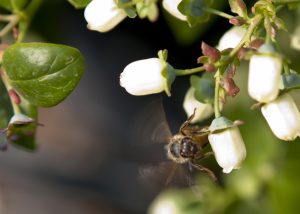
The Southeastern blueberry bee uses buzz pollination on a blueberry plant. Photo credit: Tyler Jones, UF IFAS.
This time of year, blueberry bushes are flowering and small fruit are coming onto the wild and cultivated bushes in north Florida. Many of us, myself included, look forward to the late-spring harvest of blueberries, taking our children out to u-pick operations and digging out family recipes for blueberry-filled desserts.
What many do not know, however, is that there’s a specialized bee that literally lives for this season. During the last few weeks, this little insect has been furiously pollinating blueberry bushes during its short, single-purpose lifetime.
The Southeastern blueberry bee, Habropoda labriosa is active only in mid-March to April when blueberry plants are in flower. They are smaller than bumblebees, and the yellow patches on their heads can differentiate males. Blueberry pollen is heavy and sticky, so it is not blown by the wind, and the flower anatomy is such that pollen from the male anther will not just fall onto the female stigma. Blueberry bees must instead attach themselves to the flower and rapidly vibrate their flight muscles, shaking the pollen out. Moving to the next flower, the bee’s vibrations will drop pollen from the first flower onto the next one. This phenomenon is called “sonicating” or ‘buzz pollination” and is the most effective method of creating a prolific blueberry crop.
Blueberry bees do not form hives, but create solitary nests in open, sunny, high ground. Females will dig a tunnel with a brood chamber large enough for one larva, filling it with nectar and pollen. After laying an egg, the female seals the chamber and the next generation is ready. The species produces only one generation of adults per year.
By the time we are picking fresh blueberries next month, you probably won’t see any blueberry bees around. However, we should all consider these insects’ short-lived but vitally important role in Florida’s $82 million/year blueberry industry!
For more information, check out the beautifully illustrated USDA Forest Service publication, “Bee Basics—An Introduction to our Native Bees,” or North Carolina State University’s entomology website.
- The Assassin Bug–A Beneficial Garden Visitor - January 15, 2026
- Wax Myrtle–a Native Evergreen - December 26, 2025
- Yucca–A Tough and Versatile Native Plant - November 26, 2025
